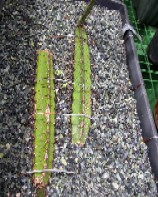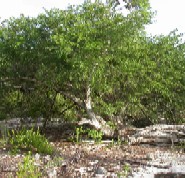UK Overseas Territories
- Home
- UK
Overseas Territories
- Biodiversity
- Threats
- Kew's historical links
- Ascension
- Anguilla
- Bermuda
- British Antarctic Territory
- British Indian Ocean Territory
- British Virgin Islands
- Cayman Islands
- Falkland Islands
- Gibraltar
- Montserrat
- Pitcairn Islands
- South Georgia
- Sovereign Base Areas on Cyprus
- St Helena
- Tristan da Cunha
- Turks and Caicos Islands
- Conservation activities
- Capacity Building
- Community involvement
- Links
- Contacts
UK Overseas Territories Programme

British Virgin Islands: Kew Connections |
||
Historical connections |
||
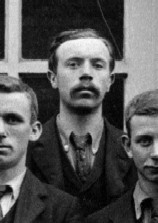 |
Walter Fishlock was a gardener at Kew at the end of the nineteenth century. In 1902, he went out to the British Virgin Islands as an agricultural instructor at the experimental station on Tortola. During his time in BVI he was instrumental in introducing various crops to the islands, but he also took part in plant collecting expeditions, sending back specimens to Kew. Among them was a specimen of Senna polyphylla var. neglecta. This plant was not rediscovered until a Kew expedition in 2004 and was collected in flower for the first time on a subsequent expedition. |
|
Activities in territory |
| Kew’s conservation staff have been involved in two major projects in the BVI, both in partnership with the BVI National Parks Trust (BVINPT) as well as other local and international organisations. |
Darwin Initiative Projects on Virgin Gorda and Anegada |
|
| The first project documented the plants and animals of Gorda Peak National Park on Virgin Gorda and of a proposed protected wetland area on Anegada. The second project assessed the coastal biodiversity of Anegada. Both projects helped to develop specialist skills in biodiversity monitoring and conservation management for staff from partner organisations within BVI. Community groups, schools and colleges have been involved in the projects, through field trips, competitions and individual investigations into local plant uses. Find out more about these projects: |
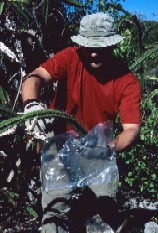 |
J R O'Neal Botanic Garden and horticultural activities |
|
. |
Several threatened native species have been established in cultivation in the J R O’Neal Botanic Garden by members of Kew’s conservation team. These include the scrambling cactus, Leptocereus quadricostatus, and Malpighia woodburyana. We have also developed a cultivation protocol for Acacia anegadensis. These activities are contributing to achieving Target 3 of the Global Strategy for Plant Conservation, which features the development of protocols for plant conservation. |
Seed collecting |
|
|
One of the Millennium Seed Bank’s seed collectors has trained staff from the BVINPT in seed collecting techniques and has worked with them to collect and store seeds from many of Anegada’s threatened native plants. |
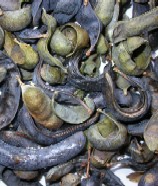 |
Raising public awareness |
|
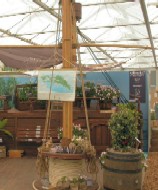 |
To raise the profile of the islands’ native plants and the threats they face, a series of posters of both unique species and of potentially invasive exotic species have been produced for display in the islands. Schoolchildren from BVI have accompanied Kew botanists on fieldtrips and have taken part in competitions to find out more about their local plants. Kew has also publicised Anegada’s plants through the Treasured Islands and Message in a Bottle exhibits at the Royal Horticultural Society’s Chelsea Flower Show and in an exhibition of photograms of Anegada's plants Caught in Time at Wakehurst Place, its sister garden in Sussex. |
Capacity building |
|
| Kew is active in building capacity for conservation within the UK Overseas Territories. Two British Virgin Islanders have taken part in Kew’s training programme, attending the International Diploma in Herbarium Techniques and the Darwin Initiative funded Threatened Plant Propagation course. Find out more about International Diploma Courses |
|
Specimen under the spotlight: Acacia anegadensis |
||
| This spiny tree is
unique to Anegada’s limestone cays. Its local name is poke-me-boy,
possibly on account of its vicious thorns. Due to local building
programmes, its habitat is under pressure and A. anegadensis
is listed as Critically Endangered. |
||
|
|
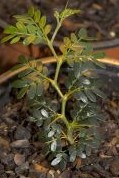 |
 |

